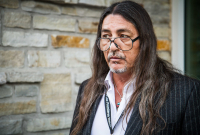Support strong Canadian climate journalism for 2025
A war of words between a First Nations grand chief and a small-town Quebec mayor instigated hours of meetings Friday with federal and provincial officials, but the underlying conflict between the two communities goes back centuries.
Kanesatake Grand Chief Serge Simon and Oka Mayor Pascal Quevillon held separate discussions with Marc Miller, parliamentary secretary to the federal minister of Crown-Indigenous relations and Quebec Indigenous Affairs Minister Sylvie D'Amours at a downtown Montreal office tower.
The meetings were held in succession, and Simon and Quevillon did not speak to each other.
Simon and his band council departed the talks vowing to cut off all communication with Quevillon after the mayor refused to apologize for derogatory comments about the First Nations territory.
"Yes the bridges are cut," Simon told reporters alongside Ghislain Picard, Assembly of First Nations regional chief for Quebec and Labrador. "We'll have no more discussions with him. My council agrees with me."
Quevillon told reporters later in the day his citizens feel like they are being taken hostage and no one is listening to them.
"It's 300 years that Oka is there, and we're being told that, finally, these are lands that belong to the Mohawks," he said. "I have the support of my population."
The recent conflict began when news broke of local developer Gregoire Gollin's intention to donate the 60 hectares known as The Pines to the Kanesatake Mohawk Council. The First Nations territory and the Quebecois town are side-by-side, along the Lake of Two Mountains off Montreal's northwestern shore.
Gollin said he was also prepared to discuss the sale of an additional 150 hectares he owns in Oka to the federal government to transfer to the Mohawk community — nearly half of which he said is adjacent to land owned by Kanesatake.
Quevillon offended many on the territory when he raised concerns about becoming encircled by Indigenous people. The mayor raised fears about declining property values in his town, of illegal garbage dumping and an expansion of cannabis and cigarette merchants.
Simon called Quevillon's statements "racist." He said he would not meet Quevillon unless the mayor apologized.
On Friday, Quevillon left his meeting with Miller and D'Amours and told reporters he was sorry — kind of.
"Maybe I didn't use certain words that some people wanted to hear," Quevillon said. "And I'm sorry. But the fundamentals are real, and I said the truth."
The Oka mayor said he had been trying to meet federal officials for three years to discuss the Mohawks' claims over the land upon which his town is settled.
"It's been years that the people of Oka have been excluded from these negotiations," he said. "Today, I took the decision to raise my voice and say: 'We are here. Take us into consideration.' We want to be heard and included."
Simon said Indigenous title exists, "even though third-party interests are on top of my title."
"We're not trying to kick anybody out," he continued. "We're not going to do to them what they did to us."
The grand chief said Quevillon is an example of a Canadian politician having the mindset of a "colonizer."
"We need to educate the people that the history of Canada is severely warped," Simon said. "We need to look at the real truth — at what happened when colonization came and the impact it has on us today."
Miller said he had frank, honest and respectful discussions with both Simon and Quevillon — but he seemed to side with Simon.
"Serge is within his rights to ask for an apology," Miller told reporters after he left the meetings. "There were irresponsible words that were spoken.
He said politicians need to avoid "inflammatory words like 'being encircled by Indigenous people', or this is an issue about 'pot cabins' or that people will build in an irresponsible fashion. They are targeted messages and I feel they are dog-whistle politics."
Miller was asked whether Quevillon has a seat at the table when the federal and provincial government discuss land claims with Indigenous peoples.
"He does not," he said. "Nor is he entitled to."
Despite the conflict with the Oka mayor, Simon said he had positive discussions with Miller and D'Amours. He said they talked with him about opening up more formal lines of communication between his council and the federal and provincial governments regarding land claims and expanding Kanesatake's territory.
But, Simon said, any discussion about the expansion of Kanesatake is premature. His people will need to be consulted and vote on whether or not to accept any donations of land that the Mohawks already claim as theirs.
"Our community still has to decide," Simon said. "I think the mayor pressed the panic button a little too quickly."




Comments